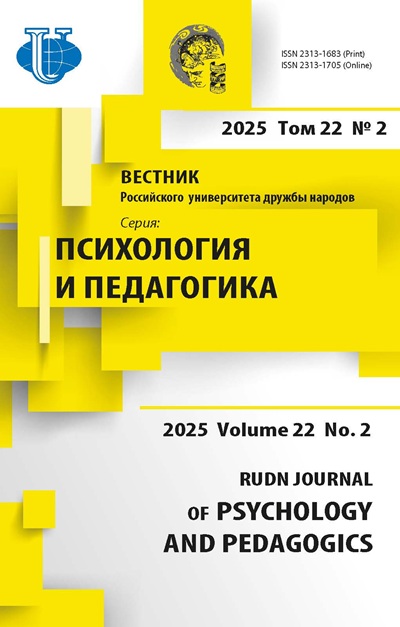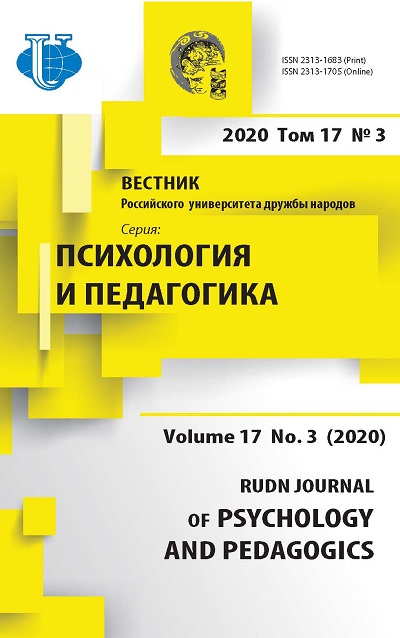Самоорганизация в непрерывном образовании: теория, практика и опыт реализации с использованием социальных сетей и дистанционного формата
- Авторы: Де Мартино М.1, Гущина Ю.Ш.1, Бойко З.В.1, Маньянини А.2, Сандор И.3, Герреро Перес Б.А.4, Исидори Э.2
-
Учреждения:
- Российский университет дружбы народов
- Римский университет «Форо Италико»
- Университет Бабеша - Бойяи
- Юридическая фирма «Де ла Круз и партнеры»
- Выпуск: Том 17, № 3 (2020)
- Страницы: 373-389
- Раздел: ОБРАЗОВАНИЕ В ЭПОХУ ГЛОБАЛИЗАЦИИ И ЦИФРОВИЗАЦИИ В РОССИИ И МИРЕ
- URL: https://journals.rudn.ru/psychology-pedagogics/article/view/24709
- DOI: https://doi.org/10.22363/2313-1683-2020-17-3-373-389
- ID: 24709
Цитировать
Полный текст
Аннотация
Полный текст
159.9.072.43Об авторах
Марио Де Мартино
Российский университет дружбы народов
Email: de-martino-m@rudn.ru
кандидат политических наук, ассистент кафедры маркетинга экономического факультета, координатор проектов «Эразмус» департамента по международному научно-образовательному сотрудничеству Российская Федерация, 117198, Москва, ул. Миклухо-Маклая, 6
Юлия Шамилевна Гущина
Российский университет дружбы народов
Email: gushchina-yush@rudn.ru
кандидат медицинских наук, доцент кафедры общей и клинической фармакологии, Медицинский институт Российская Федерация, 117198, Москва, ул. Миклухо-Маклая, 6
Злата Викторовна Бойко
Российский университет дружбы народов
Email: boikozv@yandex.ru
кандидат психологических наук, доцент, доцент кафедры управления сестринской деятельностью, Медицинский институт Российская Федерация, 117198, Москва, ул. Миклухо-Маклая, 6
Анжела Маньянини
Римский университет «Форо Италико»
Email: angela.magnanini@uniroma4.it
Ph.D., ассистент кафедры наук об активности и здоровье человека Итальянская Республика, 00135, Рим, Пьяцца Л. Де Босис, 6
Иосиф Сандор
Университет Бабеша - Бойяи
Email: iosif_sandor@yahoo.com
Ph.D., профессор, факультет физического воспитания и спорта Румыния, Клуж-Напока, 400000, Страда Пандурилор, 7
Берта Алисия Герреро Перес
Юридическая фирма «Де ла Круз и партнеры»
Email: bertagperez@hotmail.com
Ph.D., юрист-консультант по вопросам корпоративного права России Республика Панама, Панама, 0823, Зона 7, ул. Караскилья, 74Е
Эмануэле Исидори
Римский университет «Форо Италико»
Email: emanuele.isidori@uniroma4.it
Ph.D., профессор кафедры наук об активности и здоровье человека Итальянская Республика, 00135, Рим, Пьяцца Л. Де Босис, 6
Список литературы
- Aristotle. Metaphysics. Retrieved from http://classics.mit.edu/Aristotle/metaphysics.html
- Artelt, C., Baumert, J., McElvany, N., & Peschar, J. (2003). Learners for Life. Student Approaches to Learning. Results from PISA 2000. Paris: OECD.
- Barrios, A.H., & Camargo Uribe, A. (2017). Autorregulación del aprendizaje en la educación superior en Iberoamérica: Una revisión sistemática. Revista Latinoamericana de Psicología, 49(2), 146-160. https://doi.org/10.1016/j.rlp.2017.01.001
- Belovol, E.V., Bojko, Z.V., & Shurupova, E.Yu. (2018). Education for whom for…: Modern approaches. Humanitarian bulletin SU “Pereyaslav-Khmelnitsky Pedagogical University by H. Skovoroda”, 37(4), additional volume I(23): Thematic Issue “International Chelpanov’s Psycho-Educational Reading” (pp. 146-157). (In Russ.)
- Belovol, E.V., Boyko, Z.V., Radysh, I.V., & Shurupova, E.Ju. (2018). Active aging: models of seniors’ educational activity. Technologies of Living Systems, 4(15), 42-49. https://doi.org/10.18127/j20700997-201804-05 (In Russ.)
- Belovol, E.V., Boyko, Z.V., Radysh, I.V., & Shurupova, E.Ju. (2019). Life-long education: why do we need it? Technologies of Living Systems, 16(2), 63-68. https://doi.org/0.18127/j20700997-201902-07 (In Russ.)
- Belovol, E.V., Boyko, Z.V., Radysh, I.V., & Shurupova, E.Ju. (2016). Increase in person’s self-realization level as the result of third age education. Technologies of Living Systems, 7(13), 48-54. (In Russ.)
- Bobyliov, A.V. (2019). Difficulty in self-organization of educational activity. Yaroslavl Pedagogical Bulletin, 2(107), 30-35. https://doi.org/10.24411/1813-145X-2019-10348 (In Russ.).
- Boyko, Z.V., Belovol, Ye.V., Groenwald, M., & Siegień, W. (2014). Conception of lifelong education as a factor of life quality increasing for third age people (by the example of education in Poland). RUDN Journal of Psychology and Pedagogics, (4), 93-100. (In Russ.)
- Brockett, R.G., & Hiemstra, R. (1991). Self-Direction in Adult Learning: Perspectives on Theory, Research, and Practice. New York, NY: Routledge.
- Brookfield, S. (2001). Understanding and Facilitating Adult Learning. San Francisco, CA: Jossey-Bass.
- Candy, P.C. (1991). Self-direction for Lifelong Learning. San Francisco, CA: Jossey-Bass.
- Caruso, Sh.J. (2018). Toward understanding the role of Web 2.0 technology in self-directed learning and job performance. Contemporary Issues in Education Research, 11(3), 89-98. https://doi.org/10.19030/cier.v11i3.10180
- Cázares, Y. (2009). La autodirección, la persona autodirigida y sus componentes: definiciones conceptuales. El Tintero, IX(38), 1-4.
- Cfr. Commissione Europea. Aprire l’istruzione: tecniche innovative di insegnamento e di apprendimento per tutti grazie alle nuove tecnologie e alle risorse didattiche aperte, [COM(2013) 654 final], documento disponibile online all’indirizzo: https://eur-lex.europa.eu/legal-content/IT/ALL/?uri=LEGISSUM:4301337
- Chugh, R., & Umar, R. (2018). Social media in higher education: A literature review of Facebook. Education and Information Technologies, 23(2), 605-616.
- Crooks, D., Lunyk-Child, O., & Patterson, C. (2001). Facilitating self-directed learning. In E. Rideout (Ed.), Transforming Nursing Education through Problem-Based Learning (pp. 51-74). Boston, MA: Jones and Bartlett Publishers.
- Cruz Flores, G., Chehaybar y Kury, E., & Abreu, L.F. (2011). Tutoría en educación superior: Una revisión analítica de la literatura. Revista de la Educación Superior, XL(1), 189-209.
- Cuesta, M., Eklund, M., Rydin, I., & Witt, A. (2016). Using Facebook as a co-learning community in higher education. Learning, Media and Technology, 41(1), 55-72. https://doi.org/10.1080/17439884.2015.1064952
- Descartes, R. Discourse on the Method of Rightly Conducting one’s Reason and Seeking Truth in the Sciences. Retrieved from https://www.earlymoderntexts.com/assets/pdfs/descartes1637.pdf
- Duncan, D., & Barczyk, C. (2016). Facebook’s effect on learning in higher education: An empirical investigation. Information Systems Education Journal, 14(3), 14-28.
- Ellefsen, L. (2016). An investigation into perceptions of Facebook-use in higher education. International Journal of Higher Education, 5(1), 160-172. https://doi.org/10.5430/ijhe.v5n1p160
- Gibbons, M. (2002). The Self-Directed Learning Handbook: Challenging Adolescent Students to Excel. San Francisco, CA: Jossey-Bass.
- Gibbons, M., & Phillips, G. (1982). Self-education: The process of life-long learning. Canadian Journal of Education, VII(4), 67-86.
- Grow, G. (1991). Teaching learners to be self-directed: A stage approach. Adult Education Quarterly, XLI(3), 125-149.
- Guglielmino, L. (2008). Why self-directed learning? International Journal of Self-Directed Learning, V(1), 1-14.
- Hiemstra, R. (2013). Facilitating adult self-directed learning. In R. Hiemstra, P. Carré (Eds.), A Feast of Learning: International Perspectives on Adult Learning and Change (pp. 25-45). Charlotte, NC: IAP Information Age Publishing.
- Joan, R. (2015). Awareness of Facebook education among student teachers in present scenario. Journal on School Educational Technology, 10(4), 35-43.
- Kant, I. Universal natural history and theory of heaven or essay on the constitution and the mechanical origin of the whole universe according to Newtonian principles. Retrieved from http://users.clas.ufl.edu/burt/spaceshotsairheads/Kantuniversalnaturalhistory.pdf
- Knowles, M.S. (1970). The Modern Practice of Adult Education. New York, NY: Association Press.
- Knowles, M.S. (1975). Self-Directed Learning. New York, NY: Association Press.
- Knyazkova, O.N. (2014). Motivation and Value Aspects of Student’s Personality Culture of Self-Organization. Chelovek i Obrazovanie (Man and Education), (3), 139-143 (In Russ.)
- Kop, R., & Fournier, H. (2010). New dimensions to self-directed learning in an open networked learning environment. International Journal of Self Directed Learning, VII(2), 2-20.
- León Urquijo, A.P., Risco del Valle, E., & Alarcón, S. (2014). Estrategias de aprendizaje en educación superior en un modelo curricular por competencias. Revista de la Educación Superior, XLIII(4), 123-144.
- Lobato Fraile, C. (2006). Estudio y trabajo autónomos del estudiante. En Mario de Miguel Díaz (coord.), Metodologías de Enseñanza y Aprendizaje para el Desarrollo de Competencias. Madrid: Alianza Editorial.
- Manca, S., & Ranieri, M. (2016). Facebook and the others. Potentials and obstacles of Social Media for teaching in higher education. Computers & Education, 95(1), 216-230. https://doi.org/10.1016/j.compedu.2016.01.012
- Mandrikova, E.Yu. (2010). Razrabotka oprosnika samoorganizatsii deyatelnosti (OSD). Psikhologicheskaya Diagnostika, (2), 87-111. (In Russ.)
- Merrian, S., & Caffarella, R. (1991). Learning in Adulthood. A Comprehensive Guide. San Francisco, CA: Jossey Bass.
- Morris, T.H. (2019). Adaptivity through self-directed learning to meet the challenges of our ever-changing world. Adult Learning, 30(2), 56-66. 10.1177/1045159518814486' target='_blank'>https://doi: 10.1177/1045159518814486
- Narváez, M., & Prada, A. (2005). Aprendizaje autodirigido y desempeño académico. Tiempo de Educar, VI(11), 115-146.
- OECD-OCSE. (1996). Transitions to learning economies and societies in Lifelong learning for all. Meeting of the Education Commitee at Ministerial Level. Paris.
- Olivares, S.L., & López, M.V. (2014). Medición de la autopercepción de la autodirección en estudiantes de medicina de pregrado. Investigación en Educación Médica, IV(14), 75-80. https://doi.org/10.1016/S2007-5057(15)30005-3
- Owen, R.T. (1999). Self-directed learning readiness among graduate students: Implications for orientation programs. Journal of College Student Development, XL(6), 739-743.
- Pavlova, A.M. (2017). Pedagogical features of supporting the university students in the formation of self-organization skills of their activity. Obshchestvo: Sotsiologiya, Psikhologiya, Pedagogika, (7), 103-106. https://doi.org/10.24158/spp.2017 (In Russ.)
- Peruta, A., & Shields, A. (2017). Social media in higher education: Understanding how colleges and universities use Facebook. Journal of Marketing for Higher Education, 27(1), 131-143. https://doi.org/10.1080/08841241.2016.1212451
- Plato. Republic. Book VI. Retrieved from http://classics.mit.edu/Plato/republic.7.vi.html
- Smolyar, A.I., & Knyazkova, O.N. (2016). Develop Students' Capacity for Reflection in Aspect of Culture of Self-Organization of Personality. Azimuth of Scientific Research: Pedagogy and Psychology, 5(4), 228-232. (In Russ.)
- Sumuer, E. (2018). Factors related to college students’ self-directed learning with technology. Australasian Journal of Educational Technology. 34(4), 29-43. https://doi.org/10.14742/ajet.3142
- Trofimov, K.V. (2017). Self-Organization of Pedagogical University Junior Students as a Factor of Their Vital Activity Transformation in Academic and Extracurricular Work. The Science of Person: Humanitarian Researches, 4(30), 119-125. https://doi.org/10.17238/issn1998-5320.2017.30.119 (In Russ.)
- Tugrul, T. (2017). Perceived learning effectiveness of a course Facebook page: Teacher-Led versus Student-Led approach. World Journal on Educational Technology, 9(1), 35-39. https://doi.org/10.18844/wjet.v9i1.1029
Дополнительные файлы















